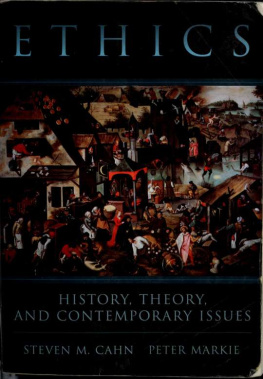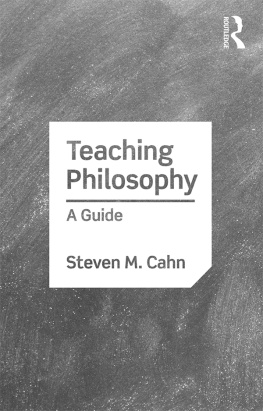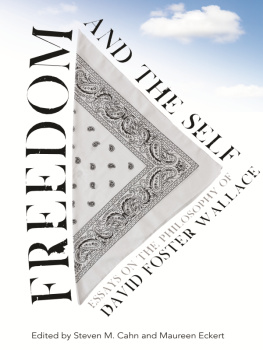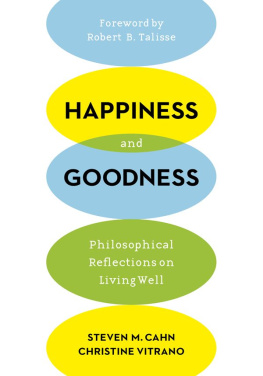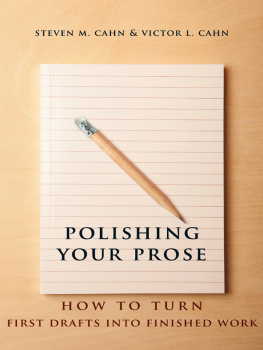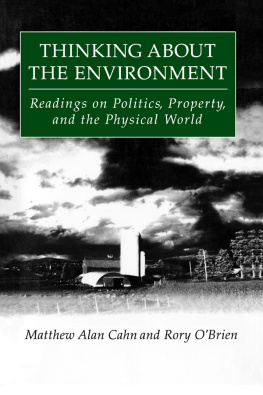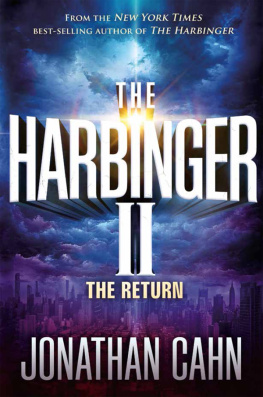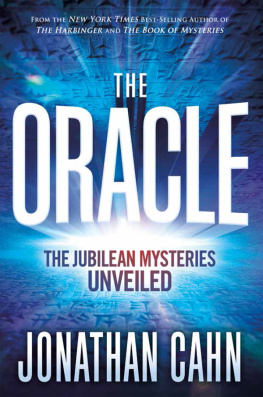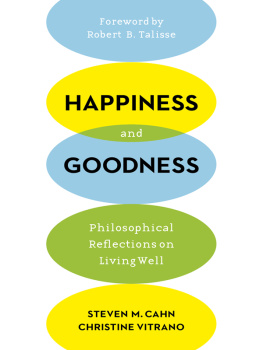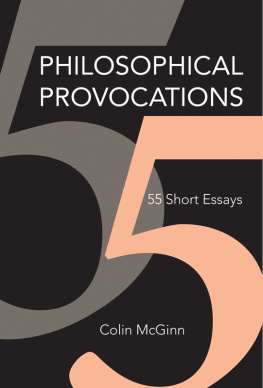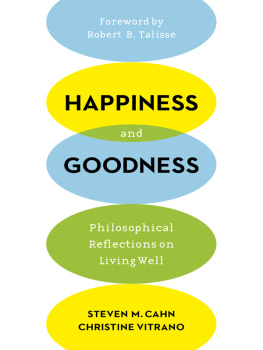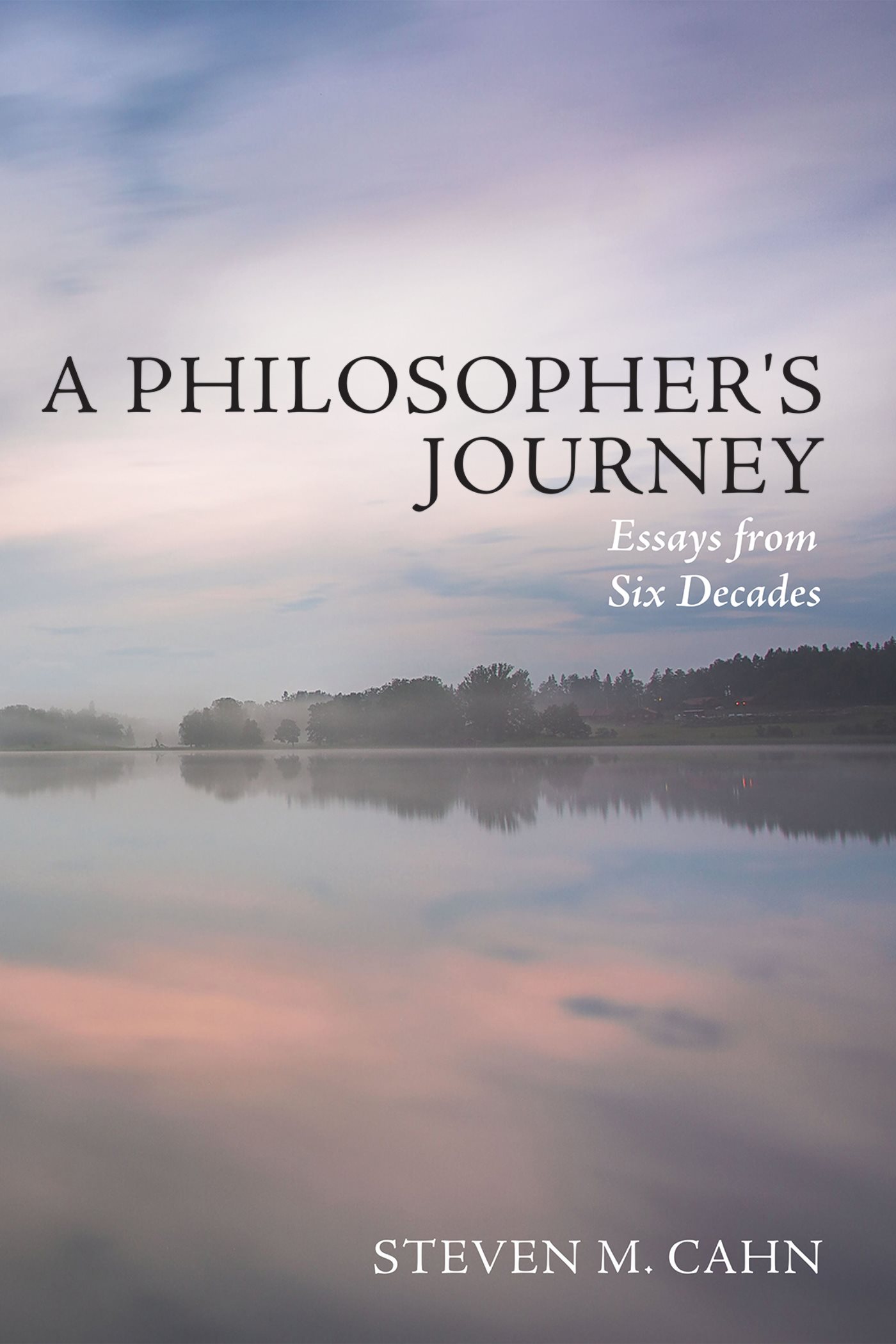I n 2019 Wipf & Stock published The Road Traveled and Other Essays , a collection of my recent writings. For this companion volume I have chosen favorite philosophical articles from the 1960 s to the present, reflecting my long-standing interests in the concept of free will, the rationality of religious belief, the insights of John Dewey, the affirmative action debate, the aims of higher education, and the nature of living well. Also included are several philosophical puzzles, a genre I have long enjoyed.
As might be expected, my work reflects the influences of my teachers, colleagues, and students. Sadly, virtually all my teachers and many of my colleagues have left the scene, and most of my former students (although happily not all) have disappeared from my view. Nevertheless, I have not forgotten how many of them contributed to my thinking.
I thank my brother, Victor L. Cahn, professor emeritus of English at Skidmore College, for his invaluable advice, stylistic and otherwise. And, as always, I am grateful to my wife, Marilyn Ross, MD. for more than I can put into words.
Part I
Free Will
Determinism and Freedom
I n 1924 the American people were horrified by a senseless crime of extraordinary brutality. The defendants were eighteen-year-old Nathan Leopold and seventeen-year-old Richard Loeb, the sons of Chicago millionaires, and brilliant students who had led seemingly idyllic lives. Leopold was the youngest graduate in the history of the University of Chicago, and Loeb the youngest graduate in the history of the University of Michigan. Suddenly they were accused of the kidnapping and vicious murder of fourteen-year-old Bobby Franks, a cousin of Loebs. Before the trial even began, Leopold and Loeb both confessed, and from across the country came an outcry for their execution.
The lawyer who agreed to defend them was Clarence Darrow, the outstanding defense attorney of his time. Because Leopold and Loeb had already admitted their crime, Darrows only chance was to explain their behavior in such a way that his clients could escape the death penalty. He was forced to argue that Leopold and Loeb were not morally responsible for what they had done, that they were not to be blamed for their actions. But how could he possibly maintain that position?
Darrows defense was a landmark in the history of criminal law. He argued that the actions of his clients resulted from hereditary and environmental forces beyond their control. Leopold suffered from a glandular disease that left him depressed and moody. Originally shy with girls, he had been sent to an all-girls school as a cure but had sustained deep psychic scars from which he never recovered. In addition, his parents instilled in him the belief that his wealth absolved him of any responsibility toward others. Pathologically inferior because of his diminutive size, and pathologically superior because of his wealth, he became an acute schizophrenic.
Loeb suffered from a nervous disorder that caused fainting spells. During his unhappy childhood, he had often thought of committing suicide. He was under the control of a domineering governess and was forced to lie and cheat to deceive her. His wealth led him to believe that he was superior to all those around him, and he developed a fascination for crime, an activity in which he could demonstrate his superiority. By the time he reached college he was severely psychotic.
In his final plea Darrow recounted these facts. His central theme was that Leopold and Loeb were in the grip of powers beyond their control, that they themselves were victims.
I do not know what it was that made these boys do this mad act, but I do know there is a reason for it. I know they did not beget themselves. I know that any one of an infinite number of causes reaching back to the beginning might be working out in these boys minds, whom you are asked to hang in malice and in hatred and in injustice, because someone in the past has sinned against them... What had this boy to do with it? He was not his own father; he was not his own mother; he was not his own grandparents. All of this was handed to him. He did not surround himself with governesses and wealth. He did not make himself. And yet he is to be compelled to pay.
Darrows pleas was successful, for Leopold and Loeb escaped execution and were sentenced to life imprisonment. Although they had committed crimes and were legally responsible for their actions, the judge believed they were not morally responsible, for they had not acted freely.
If the line of argument that Darrow utilized in the Leopold-Loeb case is sound, then not only were Leopold and Loeb not to blame for what they had done, but no person is ever to blame for any actions. As Darrow himself put it, We are all helpless. But is Darrows argument sound? In other words, does the conclusion follow from the premises, and are the premises true?
We can formalize his argument as follows:
Premise : No action is free if it must occur.
Premise : In the case of every event that occurs, antecedent conditions, known or unknown, ensure the events occurrence.
Conclusion: Therefore no action is free.
Premise () assumes that an action is free only if it is within the agents power to perform it and within the agents power not to perform it. In other words, whether a free action will occur is up to the agent. If circumstances require the agent to perform a certain action or require the agent not to perform it, then the action is not free.
Premise () is the thesis known as determinism. Put graphically, it is the claim that if at any time a being knew the position of every particle in the universe and all the forces acting on each particle, then that being could predict with certainty every future event. Determinism does not presume such a being exists; the being is only imagined in order to illustrate what the world would be like if determinism were true.
Darrows conclusion, which is supposed to follow from premises () and (), is that no person has free will. Note that to have free will does not imply being free with regard to all actions, for only the mythical Superman is free to leap tall buildings at a single bound. But so long as at least some of an agents actions are free, the agent is said to have free will. What Darrows argument purports to prove is that not a single human action that has ever been performed has been performed freely.
Does the conclusion of Darrows argument follow from the premises? If premise () is true, then every event that occurs must occur, for its occurrence is ensured by antecedent conditions. Because every action is an event, it follows from premise () that every action that occurs must occur. But according to premise (), no action is free if it must occur. Thus if premises () and () are true, it follows that no action is freethe conclusion of Darrows argument.


